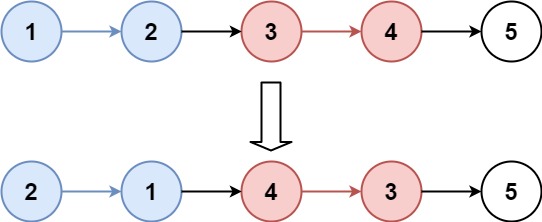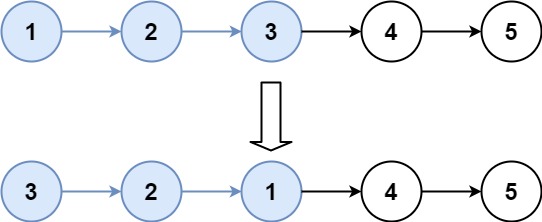LeetCode-in-All
25. Reverse Nodes in k-Group
Hard
Given a linked list, reverse the nodes of a linked list k at a time and return its modified list.
k is a positive integer and is less than or equal to the length of the linked list. If the number of nodes is not a multiple of k then left-out nodes, in the end, should remain as it is.
You may not alter the values in the list’s nodes, only nodes themselves may be changed.
Example 1:

Input: head = [1,2,3,4,5], k = 2
Output: [2,1,4,3,5]
Example 2:

Input: head = [1,2,3,4,5], k = 3
Output: [3,2,1,4,5]
Example 3:
Input: head = [1,2,3,4,5], k = 1
Output: [1,2,3,4,5]
Example 4:
Input: head = [1], k = 1
Output: [1]
Constraints:
- The number of nodes in the list is in the range
sz. 1 <= sz <= 50000 <= Node.val <= 10001 <= k <= sz
Follow-up: Can you solve the problem in O(1) extra memory space?
Solution
# Definition for singly-linked list.
#
# defmodule ListNode do
# @type t :: %__MODULE__{
# val: integer,
# next: ListNode.t() | nil
# }
# defstruct val: 0, next: nil
# end
defmodule Solution do
@spec reverse_k_group(head :: ListNode.t() | nil, k :: integer) :: ListNode.t() | nil
def reverse_k_group(head, k) do
cond do
# if length is less then k then do not change it
length(0, head) < k -> head
true -> head |> drop(k) |> reverse_k_group(k) |> reverse_list(head, k)
end
end
def reverse_list(acc, _, 0), do: acc
def reverse_list(acc, list, k) do
reverse_list(%ListNode{list | next: acc}, list.next, k - 1)
end
def drop(nil, _), do: nil
def drop(head, 0), do: head
def drop(head, n), do: drop(head.next, n - 1)
def length(acc, nil), do: acc
def length(acc, head), do: length(acc + 1, head.next)
end

